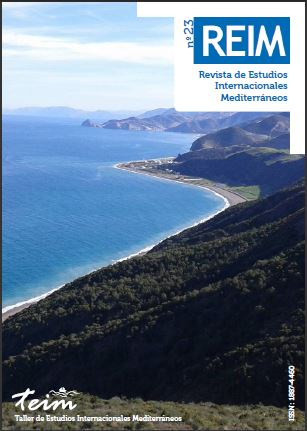Mots-clés :
Egipto, España, Oriente Medio, Política Exterior(c) Tous droits réservés Bárbara Azaola Piazza, Irene González González 2017

Cette œuvre est sous licence Creative Commons Attribution - Pas d'Utilisation Commerciale 4.0 International.
Résumé
En este artículo se presenta un estudio sobre la poli?tica exterior espan?ola hacia Egipto tras la caiída del presidente Hosni Mubarak en febrero de 2011, utilizando un novedoso instrumento de anaálisis, la Base de Datos de Poli?tica Exterior (BDPEX). La BDPEX es una base de datos online http://www.bdpexonline.org/acerca.php. Concebida como herramienta de trabajo innovadora destinada a paliar el de?ficit de sistematizacioón de los estudios en este a?mbito. La informacio?n recogida en ella se centra, por el momento, en las relaciones con la regioón del Mediterraáneo y el mundo árabe.
Este trabajo se basa en la explotacio?n, a partir de los datos recogidos en la BDPEX, de una serie de nuevos indicadores en el estudio de las relaciones exteriores espan?olas hacia Oriente Medio, tomando como estudio de caso concreto las relaciones bilaterales entre Espan?a y Egipto durante el periodo 2011-2015.
Téléchargements
Références
AZAOLA PIAZZA, Bárbara y GONZÁLEZ GONZÁLEZ, Irene (enero-junio2012): “Estudios de caso de la política exterior española hacia el Mundo Árabe y Musulmán: Egipto” en REIM, Revista de Estudios Internacionales Mediterráneos, no 12, pp. 87-110. https://revistas.uam.es/index.php/reim/article/view/875;
FERNÁNDEZ-MOLINA, Irene (2017): “EU and EU Member States’ Responses to the Arab Spring”, en SZMOLKA, Inmaculada (dir.): Political Change in the Middle East and North Africa, Edinburgh, Edinburgh University Press, pp. 301-325.
HERNANDO DE LARRAMENDI, Miguel (2013): “El islamismo poli?tico y el ejercicio del poder tras el Despertar A?rabe. Los casos de Egipto, Tu?nez y Marruecos”, Islamismos en (r)evolución: movilización social y cambio poli?tico, Cuadernos de Estrategia, no 163, pp. 71-116. http://www.ieee.es/Galerias/fichero/cuadernos/CE_163_Islamismos_en_revolucion.M ovilizacion_social_y_cambio_politico.pdf
HERNANDO DE LARRAMENDI, Miguel; GONZÁLEZ GONZÁLEZ, Irene y LÓPEZ GARCÍA, Bernabé? (Dir.) (2015): El Instituto Hispano-Árabe de Cultura. Orígenes y evolución de la diplomacia pública española hacia el mundo árabe, Madrid, AECID.
LÓPEZ GARCÍA, Bernabé y HERNANDO DE LARRAMENDI, Miguel (Dir.) (2010): España, el Mediterráneo y el mundo arabomusulmán. Diplomacia e historia, Barcelona, Icaria.
MICHOU, Héléne (2013): “Egipto: estrategias de cooperación frente a una revolución inacabada” en MICHOU, Héléne; SOLER I LECHA, Eduard y TORREBLANCA, Jose? Antonio (Dir.): Europa y la democracia en el norte de África: una segunda oportunidad, Barcelona, CIDOB/ECFR/UNED.
MONIER, Elizabeth y RANKO, Annette (2014): “The Failure of the Muslim Brotherhood: Implications for Egypt’s Regional Status” en FU?RTIG, H (Dir.): Regional Powers in the Middle East. New Constellations after the Arab Revolts, New York, Palgrave Macmillan, pp. 61-79.
PINFARI, Marco (2013): “The EU, Egypt and Morsi’s Rise and Fall: ‘Strategic Patience’ and Its Discontents”, Mediterranean Politics, Volume 18, Issue 3, pp. 460-466, http://www.tandfonline.com/doi/full/10.1080/13629395.2013.840441?scroll=top&ne edAccess=true
????17
PLANET, Ana Isabel y HERNANDO DE LARRAMENDI, Miguel (2017): “La poliítica exterior española y los movimientos islamistas: de la victoria del Frente Islámico de Salvación (FIS) a la Primavera Árabe” en BARONA CASTAÑEDA, Claudia; REYES LUGARDO, Marco Antonio y IASEL SÁNCHEZ, Indira (eds.): Modernidades africanas: entre el eurocentrismo, el islamismo y el capitalismo confuciano, México, Tirant lo Blanch, pp. 101-130.

